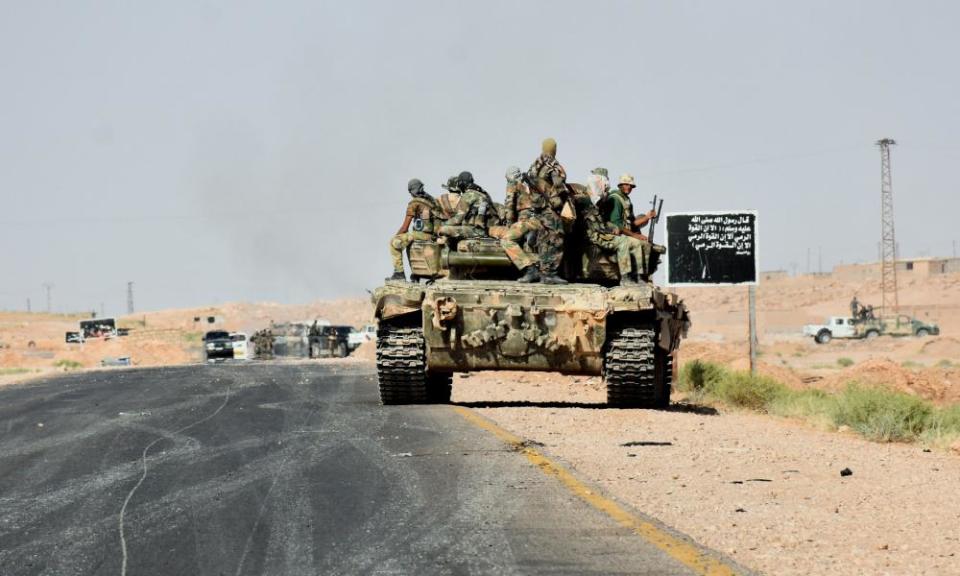Scores of Russian mercenaries reportedly killed by US airstrikes in Syria
Reports suggest high number of casualties in Deir Ezzor region
US officials say airstrikes carried out against pro-regime force

Scores of Russian mercenaries were reportedly killed when US forces carried out air strikes against a pro-regime force in eastern Syria last week, according to US and Russian reports.
If the high estimates of Russian casualties are confirmed, it would be the most lethal clash between US and Russian citizens since the end of the cold war, and it comes at a time when proxy forces in Syria are increasingly coming into contact, as they compete for territory vacated by retreating Islamic State militants.
Bloomberg News quoted Russian sources as saying as many as 200 Russian nationals could have been killed in a clash last Wednesday and Thursday around the oil fields of Deir Ezzor region between forces loyal to Bashar al-Assad and a Kurdish-led opposition force supported by US advisers.
The New York Times said that Russian and Syrian officials had estimated that dozens of Russians had been killed.
US Central Command said on Tuesday that US forces came under fire from a tank, and that they responded with three hours of intense strikes from drones and B-52 bombers against the attackers, which it described as a unit of 300 to 500 fighters.
Air force Lt Gen Jeffrey Harrigan said US advisers had been in an operating base alongside units of the mostly-Kurdish Syrian Democratic Forces (SDF) in the course of anti-Isis operations, when they came under tank fire. He added that the senior officer at the base called in airstrikes in response.
Harrigan said the attacking forces were fighting on the side of Bashar al-Assad’s regime, but said he would “not speculate on the composition of this force, or whose control they were under”.
He said: “This is a hostile force that was coming after our partners and coalition advisers so we are going to defend ourselves.”
The Conflict Intelligence Team, a group of well-respected Russian online researchers, said it had found three Twitter posts announcing the deaths of Russian mercenaries in Syria on 7 February.
“It is beyond doubt that this incident indeed took place. It is notable that the posts about their deaths emerged rather quickly – relatives and colleagues often learn of Russian mercenaries’ deaths weeks or even months after the fact,” the group said in a post.
Grigory Yavlinsky, an opposition politician, said that if Russian citizens had been killed in large numbers, Vladimir Putin and other officials owed the country an explanation.
“I demand an explanation as to why Russian nationals take part in ground military operations in Syria, despite the statements by the president and defense minister that Russian military formations will be withdrawn from this country,” Yavlinsky said.
Without mentioning the incident directly, Russia’s foreign minister, Sergey Lavrov, warned on Tuesday that “Americans have taken dangerous unilateral steps” in Syria in siding with SDF forces, who control an extensive region in northern Syria.
“Those steps look increasingly as part of efforts to create a quasi-state on a large part of Syrian territory from the eastern bank of the Euphrates all the way to the border with Iraq,” Lavrov said, in remarks that highlighted the geopolitical jostling in Syria in the wake of the fight against Isis.
Igor Strelkov, a nationalist army veteran who was instrumental in Russia’s military operations in eastern Ukraine but now opposes the Kremlin, said in an online post that the deaths should be a warning for any Russians considering “going to Syria to earn [money]”.
Dmitry Peskov, Putin’s spokesman, said the Kremlin had no information about the deaths of any Russian mercenaries in Syria. “We only deal with the data that concerns Russian forces servicemen,” he said. “We don’t have data about other Russians who could be in Syria.”

